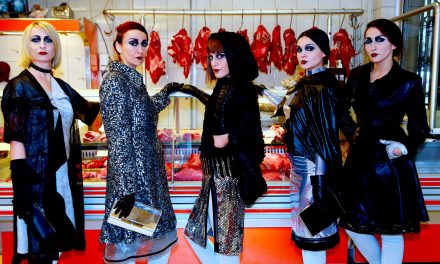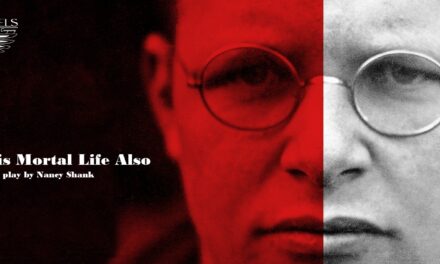Bojana Janković calls out British theatre‘s extreme reluctance to stage plays that aren’t in English, or heavily adapted – and explains how this insular approach excludes immigrants and stifles debate.
So many things about the way theatre in the UK is structured – from project time frames and budgets to audience habits and theatre culture in general – are stacked up against plays not written in English. The funding is scarce, and the production model is focused on efficiency, but foreign plays need translating, which takes time and costs money. Even if the play is out of copyright, most relevant translations won’t be. Theatres have an obligation to support new domestic writing, not international writing. There is also the issue of tinkering with text – the very act of translation is often seen as a direct attack on the essence of a carefully crafted play.
Immigrant plays, with the exception of those from English-speaking countries, face an uphill battle so steep that their miniscule presence almost feels justified. Except for one thing: when they do get staged, foreign plays are almost inevitably subjected to adaptations. The translation is just a part of the assimilation process a play goes through; it’s not just foreign words that become English, it’s also entire narratives, characters, and cultures that are often made local, or at the very least tailored to local interests. Goldoni’s Commedia dell’arte revival gets submerged in Brighton and carry-on; Dom Juan becomes DJ and lands in Soho. The ‘in a new version by’ tag guarantees that foreign goods are safe for domestic consumption.
With the idea of Europe dissected daily and the threat of secession looming, it seems pertinent that the biggest continental classics often need to be adapted before they make it to curtain call. Not all of them become British – but a vast majority are passed on to big writing names, tasked with making some of the greatest plays ever written relevant to the UK. The Old Vic recently called upon David Hare to tackle Ibsen; Patrick Marber sent Strindberg’s Miss Julie to 1945 Northern Ireland. Robert Icke’s Uncle Vanya anglicized the difficult Russian names and his Oresteia was a new trilogy based on mythology and Aeschylus in all but name. I am yet to see The Threepenny Opera, NT’s subdued contribution to the European conversation, but it’s worth noting that all publicity material emphasises the German play is based on John Gay’s The Beggar’s Opera and therefore English after all. Brecht’s classic was handed over to Simon Stephens, whose work on similar projects often offers an important alternative to adapting: his ‘version’ of The Cherry Orchard saw him approach Chekhov more like a continental dramaturg than a British cultural interpreter.
It’s tempting to argue that in a theatre culture so focused on text, an adaptation becomes a substitute for a director’s vision, the UK’s take on regietheater. It’s also dangerous to automatically call any adaptation a work of cultural appropriation. Yet when what is meant to be an artistic decision becomes a habit, and combines with an almost absolute lack of translated contemporary plays on British stages, the result is a suffocation of cultural representations for any and all immigrant communities. The theatre that uses adaptation to remove the foreign from its remit is subtly professing that other cultures and countries are un-understandable, inherently and crucially different. In the UK, this is the same theatre that has worked hard to position itself as an arena for alternative thinking on political hot topics, from British foreign politics to labour laws, via hacking and modern warfare (to name but a few examples). When it comes to immigration however, theatres have helped foster an island mentality within culture; in the process they disinvited immigrants and well, excuse the term, made them an other.
Contemporary plays in other languages are more difficult to adapt – there’s no period to adjust, no history to overcome and perhaps, as a result, no wealth of opportunities to see them. The task of building an audience for contemporary translations is currently in the hands of only a few major organizations (like the Actors Touring Company or to a small extent, the Royal Court), as well as a growing number of independent companies who often initiate partnerships. OpenWorks produced Sibylle Berg’s AND NOW: THE WORLD!in collaboration with the Company of Angels and Derby Theatre. Just a Must is a company dedicated to staging works in translation; their productions include English language premiers of two viciously verbal texts, Elfriede Jelinek’s Sports Play and Werner Schwab’s Dead at Last, at Last no More Air. Both performances, however, seemed to be waging a war against the production reality, showing that accepting immigrant theatre habits – like longer rehearsals and a different style of acting – might have to go hand in hand with opening doors to immigrant plays. The most recent attempt to figure out translating comes from academia, though it jumps straight into theatre practice. Translation Adaptation Otherness: ‘Foreignisation’ in Theatre Practice is a two-year project from the University of Kent and Firehouse Creative Productions, which considers how translations contribute to equality of representation and diversity of theatre audiences. In its first stage, Translating Theatre: ‘Foreignisation’ on Stage, the project is undertaking rehearsed readings of three plays, representing three of the most widely spoken foreign languages in the UK – Spanish, French and Polish. The playwrights, Denise Despeyroux, Marie Ndiaye and Piotr Lachmann, and their plays Black Tenderness, The Snakes andGliwice Hamlet, are not simply foreign: they also mix metatheatre and politics, European history and personal experiences of immigration and multicultural or multinational families. The immediate implication of theatre mechanisms and intertwined national histories, suggests the project will consider translation as political and potentially socially inclusive, rather than just a literary act. (Full disclosure – I will be the embedded critic for one of the plays).
When theatres adopt the adapt/ignore approach to texts that warrant a translation, they are not just disenfranchising immigrant communities from the British one. They are also distancing their primary audiences from the matter-of-fact diversity that surrounds them. The process has meant theatres haven’t played a particularly prolific role in the current ‘what has Europe ever done for us’ referendum debate; there hasn’t been much chance for the British and the non-British to share cultural experiences that concern them both. (Of course, immigrants do pop up in British plays – though for Eastern Europeans, for example, this means a seemingly endless line of destitute Bond-villains.)
This, like any other problem of diversity, goes behind the scenes, to where artistic directors, literary departments and theatre companies are deciding on their next move. Production and marketing challenges might prove dissuading, especially if an exhilarating play is not in place to motivate. The search for exciting new plays is as laborious as the search for exciting new names, although it can be done sitting down, rather than running around the Edinburgh Fringe. True, it might help to know a foreign language or two as not many things have been translated to English; some have and places like the Goethe Institut’s Theatre Library (for all things German) and Nova Drama (with predominantly Serbian plays) are just two examples of where one can pick up an already translated play and start digging for a gem. If one was so inclined.
This article was originally published on Exeunt Magazine. Reposted with permission. Read the original article.
This post was written by the author in their personal capacity.The opinions expressed in this article are the author’s own and do not reflect the view of The Theatre Times, their staff or collaborators.
This post was written by Bojana Jankovic - Exeunt Magazine.
The views expressed here belong to the author and do not necessarily reflect our views and opinions.


















